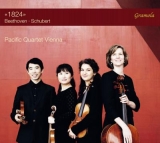Das Pacific Quartet Vienna hat diesem Gramola-Album das Motto 1824 gegeben, da die beiden Werke in diesem Jahr entstanden sind. Sie haben das erste der späten Quartette von Beethoven, die in eine neue Welt vorstoßen, mit dem unter dem Beinamen Rosamunde bekannte Stück von Schubert zusammengefügt.
Das Pacific Quartet Vienna liest das nach der Syphiliserkrankung von Schubert geschaffene Werk als Erschütterung der Seele. Dementsprechend gestalten sie die Eingangstakte als erregt flirrenden Zustand in Bratsche und Cello, auf den die erste Geige irdisch draufsattelt. Andere Interpreten geben diesem Anfang eher ein ätherisch, leicht verschleiertes Gepräge, über dem die Violine luftig schwebt. Diesen Ansatz mag man im gesamten Weg wahrnehmen. Als ob andere hier eine schöne, vielleicht auch heile Welt spielen, dieses Quartett jedoch genauer, nämlich hinter die Kulisse geschaut hat.
Das Es-Dur Quartett von Beethoven gehen sie dagegen eher spielerisch leicht und elegant an. Die Tonart Es-Dur wird als heroisch angesehen. Die Interpreten zeigen hier aber deutlicher den poetischen Charakter, der dem Quartett ebenfalls innewohnt. So lesen sie das Stück eher licht als pathetisch. Doch auch schon hier sind sie ihrer Linie treu, die Textur in allen vier Linien deutlich herauszuarbeiten und geben der Musik damit mit ausgeprägte Struktur. Im Scherzando bei Beethoven wirkt das dann gelegentlich wie raue See. In Verbindung mit ihrer spieltechnischen Sorgfalt und Contenance formen sie so spannende Betrachtungen dieser, so meint man, eigentlich bekannten Werke.
The Pacific Quartet Vienna has given this album the motto 1824, since the two works were composed in that year. They have paired the first of Beethoven’s late quartets, which venture into a new world, with the piece by Schubert known as Rosamunde.
The Pacific Quartet Vienna reads the work, composed after Schubert contracted syphilis, as a shaking of the soul. Accordingly, they shape the opening bars as an excited shimmering state in viola and cello, upon which the first violin earthily saddles. Other performers give this opening more of an ethereal, slightly veiled feel, with the violin floating airily above. One may perceive this approach throughout the track. It’s as if others are playing a beautiful, perhaps ideal world here, but this quartet has looked more closely behind the scenes.
In contrast, they approach Beethoven’s E-flat major quartet in a rather playfully light and elegant manner. The key of E-flat major is seen as heroic. Here, however, the performers show more clearly the poetic character that is also inherent in the quartet. Thus they read the piece lightly rather than pathetically. Yet even here they are true to their line of clearly bringing out the texture in all four lines, thus giving the music with distinct structure. In Beethoven’s scherzando movement, this occasionally comes across as rough seas. In combination with their technical care and composure, they form exciting reflections of these, one would think, well-known works.
























